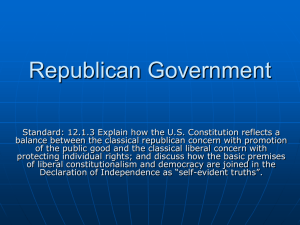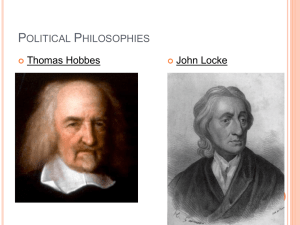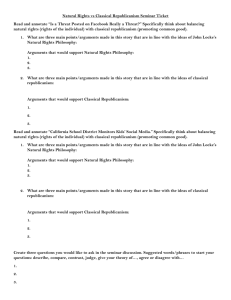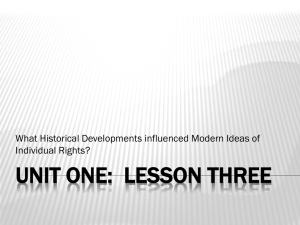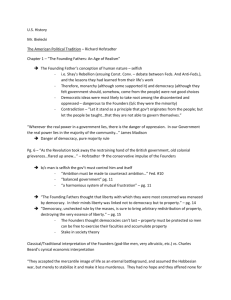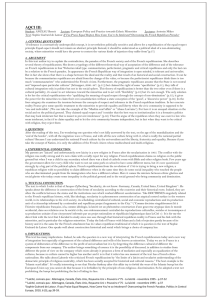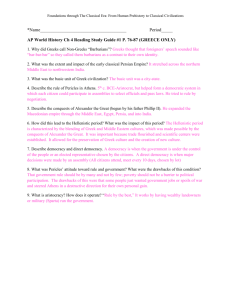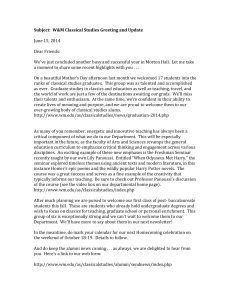AOB Resource 2C
advertisement
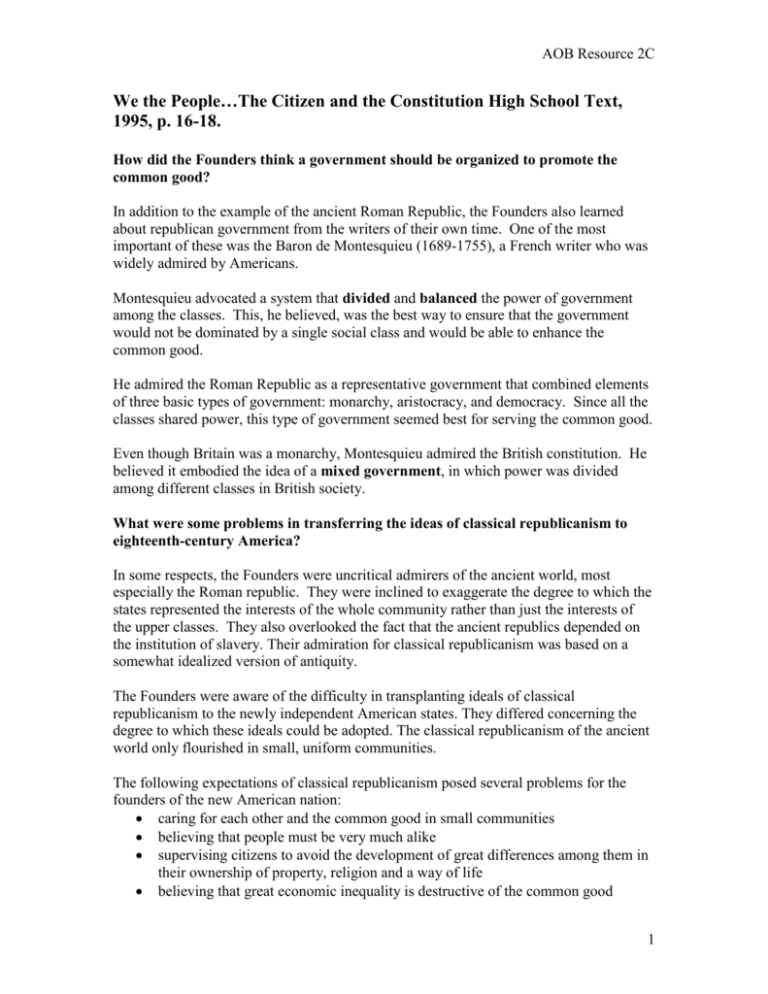
AOB Resource 2C We the People…The Citizen and the Constitution High School Text, 1995, p. 16-18. How did the Founders think a government should be organized to promote the common good? In addition to the example of the ancient Roman Republic, the Founders also learned about republican government from the writers of their own time. One of the most important of these was the Baron de Montesquieu (1689-1755), a French writer who was widely admired by Americans. Montesquieu advocated a system that divided and balanced the power of government among the classes. This, he believed, was the best way to ensure that the government would not be dominated by a single social class and would be able to enhance the common good. He admired the Roman Republic as a representative government that combined elements of three basic types of government: monarchy, aristocracy, and democracy. Since all the classes shared power, this type of government seemed best for serving the common good. Even though Britain was a monarchy, Montesquieu admired the British constitution. He believed it embodied the idea of a mixed government, in which power was divided among different classes in British society. What were some problems in transferring the ideas of classical republicanism to eighteenth-century America? In some respects, the Founders were uncritical admirers of the ancient world, most especially the Roman republic. They were inclined to exaggerate the degree to which the states represented the interests of the whole community rather than just the interests of the upper classes. They also overlooked the fact that the ancient republics depended on the institution of slavery. Their admiration for classical republicanism was based on a somewhat idealized version of antiquity. The Founders were aware of the difficulty in transplanting ideals of classical republicanism to the newly independent American states. They differed concerning the degree to which these ideals could be adopted. The classical republicanism of the ancient world only flourished in small, uniform communities. The following expectations of classical republicanism posed several problems for the founders of the new American nation: caring for each other and the common good in small communities believing that people must be very much alike supervising citizens to avoid the development of great differences among them in their ownership of property, religion and a way of life believing that great economic inequality is destructive of the common good 1 AOB Resource 2C having one official “established” religion and one set of family and moral standards which everyone would follow How was a political ideal based on small, tightly knit communities to be applied to a new country as large as the United States which represented people of different cultural backgrounds, economic conditions and religious beliefs? The classical republican idea of civic virtue conflicted with the Founders’ belief in natural rights and with their understanding of human nature as defined by Locke and other natural rights philosophers. The natural rights philosophy considered the rights of the individual to be of primary importance. The state existed to serve the interests of the individual, instead of the other way around. In classical republicanism, the rights of the community as a whole came first. Americans of the founding era seemed more representative of human nature as described by the natural rights philosophers than the ideal expected by the civic virtue of classical republicanism. They and their ancestors had come to the new land to take advantage of opportunities it offered. Such restless, diverse, and ambitious people were ill-suited for the ideals of sacrifice and conformity of classical republicanism. How did James Madison refine the ideas of classical republicanism? James Madison was one of the most important founders responsible for creating the U.S. constitution. He has been called “the Father of the Constitution.” He was very influential in translating ideas of classical republicanism in such a way as to make them practical in the new American republic. Madison defined the difference between democracies and republics in the following way: In a democracy, the people administer the government themselves. These “direct democracies” must be confined to small communities like ancient city-states of Greece. Ina republic, the people’s representatives administer the government, allowing it to be extended over a much larger area. Madison believed, therefore, that America could and should have a republican form of government. Laws would be made and administered by representatives elected by the people. Madison also accepted certain principles of democracy. He insisted that members of government should be elected by a large number of people, rather than by a small number or a specially favored group. Such a form of government was a democracy in the sense that it derived authority- its right to govern – from the people as a whole. Madison’s new definition of republican government, therefore also could be defined as representative democracy. In this way the two classical ideas of republic and democracy were adapted to the new form of government created by the Founders. 2 AOB Resource 2C How did the Founders adapt the ideal of civic virtue to the American republic? Like the other Founders, Madison understood the importance of informed and publicspirited citizens to the new government. He had to modify the classic definition of civic virtue to make it practical in the very different conditions of America. He accepted the natural rights philosophers’ view of human nature- people were motivated primarily by self interest. He believed that the pursuit of self-interest could in its own way further the common good. For example, the statesman’s desire for fame and admiration from others would lead him to practice civic virtue. The common good could be served by each individual pursuing his or her economic self-interest. Each would contribute to the general prosperity. Madison realized also that as people pursue their own interests, they sometimes act against the interest of others and against the common good. Any sound government had to make allowances for this. As Madison said, if all people were angels, there would be no need for government. He argued for a government that would encourage people to act as good republican citizens possessing the quality of civic virtue. At the same time, this government would guard against the consequences if they did not. This is why Madison favored a constitution that limited government by the following methods: separation of powers a system of checks and balances The American adaptation of the principles of classical republicanism was, then, a sort of compromise. The founders created a form of government they called republican even though it was different from the models of republicanism in the ancient world. They believed that it was important for citizens to possess civic virtue. Civic virtue could not always be relied upon, however. Therefore, proper structure provided by a system of representation with separation of powers and checks and balances also was necessary to protect he common good. 3
